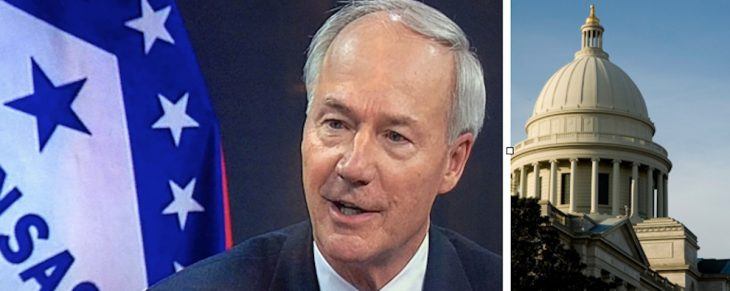Governor discusses legislative agenda, Medicaid waiver, redistricting
by November 22, 2020 10:03 am 1,021 views

Gov. Asa Hutchinson anticipates a lot of negotiation over taxes in the upcoming legislative session.
With an expected $240 million surplus, Hutchinson has laid out proposals to:
- Reduce the top individual income tax rate for new residents to 4.9% for five years. Doing so would attract tech and manufacturing talent and retirees, he said.
- Lower the sales tax on used vehicles from 6.5% to 3.5% for those with sale prices between $4,000 and $10,000. There is no tax for cars sold for less than $4,000.
- Place $100 million in the state’s long-term reserve account.
Already, the top tax rate will fall from 6.9% to 5.9% next year because of legislation passed in 2019.
State lawmakers have openly balked at Hutchinson’s proposed 4.9% top tax rate to recruit out-of-state people to move to Arkansas. Many have said they can’t or won’t sell that to their constituents.
“They have to understand, and the constituents need to understand, that this is a way to get all Arkansans to a lower income tax rate, and that can happen by setting a goal and creating growth,” Hutchinson said in a Sunday (Nov. 22) interview on Talk Business & Politics. “The legislature may or may not agree with that, but that’s a kind of pro-growth idea for a tax cut that makes sense. And you’ve got to sell it first to the Arkansas voters, and they’ll sell it to the legislators.”
Rep. Joe Jett, R-Success, has suggested a tax cut to eliminate the lowest income tax bracket in Arkansas – those making below $22,900 a year. According to Jett, it could pull about 48% of taxpayers off the tax rolls while costing the state approximately $84 million. Hutchinson contends that tax reform proposal is about $34 million more than he is advocating.
“…It’s a very expensive proposal that he has. But this gives the legislature some room to debate the earned income tax credit that many are pushing. Is that the best means to help our low and middle-income taxpayers in Arkansas? Or is it Representative Jett’s idea to eliminate that for the tax rate for lower income?” said Hutchinson. “I think there’ll be a very vigorous debate in the General Assembly, but we’ve already set aside $50 million for that debate.”
Arkansas’ Medicaid waiver that allowed the private option and subsequently Arkansas Works, will be up for reconsideration by 2022. A pending U.S. Supreme Court decision involving the viability of the Affordable Care Act could be a factor in that waiver’s update. Another variable is the growing conservatism of the Arkansas legislature, which will see Republicans gain more seats for their supermajorities.
Hutchinson said state officials are working with legislators on the new waiver and he expects it will be well-received in the 93rd General Assembly.
“My expectation is that it will pass, hopefully with a very large margin this next time, because it’s part of the fabric of our healthcare system in Arkansas,” he said. “And with what we expect in the incoming administration, I don’t see that changing. I think the Supreme Court, obviously, their decision on the Affordable Care Act will have a bearing on all of this. But based upon the oral arguments, I think there’s a likelihood that that will be affirmed, at least the majority of it.”
The governor has also expressed his support for a hate crimes law. He said it is past time for Arkansas, one of three states without hate crimes legislation, to put a law on the books.
“I think there are arguments that sort of fell 30 years ago, that somehow this is thought police, somehow this is going to have people investigating what people are thinking in their mind. It’s just as far as it can be from the truth. And so, you’ve got to overcome some of those objections,” Hutchinson said.
“This is not a new crime that’s created. It is simply an enhancement of existing violent crime acts because someone is targeting a particular profile,” he added. “I think it’s a matter of education and coming together with the right bill, and I hope that gets passed this session.”
Redrawing Congressional districts and legislative lines will be a major undertaking in the 2021 session. Once every ten years, reapportionment is done based on new U.S. Census data. Republicans will be in charge of the process of redrawing those lines for the first time.
Hutchinson doesn’t see anything radical happening in the process.
“I don’t believe that the redistricting of the legislative seats will have a dramatic impact. I think that [Arkansas] is a ruby red state, regardless of how you draw the lines,” he said. “I know that there can be additional African-American majority seats that might be created. That’s one option that’s there. There can be better lines that are drawn that are more consistent with cities and counties. And so, I really think that we can follow some principles that will lead to a good result.”
You can watch Gov. Hutchinson’s full interview in the video below.
